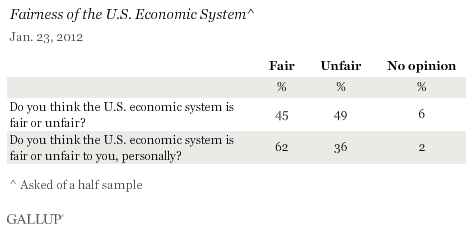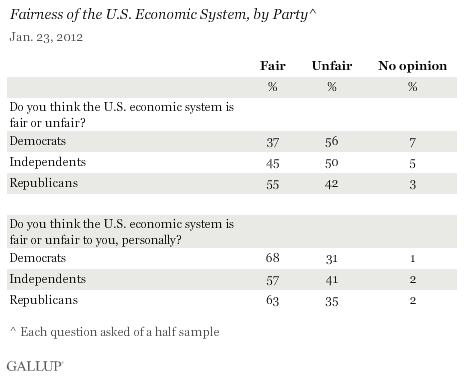PRINCETON, NJ -- About half (49%) of Americans agree with President Barack Obama's claim that the U.S. economic system is unfair, while 45% say it is fair. At the same time, 62% say the U.S. economic system is fair to them personally.

President Obama called for greater economic fairness in his State of the Union address Tuesday night, pledging to "restore an economy where everyone gets a fair shot, everyone does their fair share, and everyone plays by the same set of rules." Obama's clear underlying assumption is that the U.S. economic system at this point is not fair.
The results of the Gallup survey conducted Jan. 23, in advance of the speech, suggest that Americans are significantly more positive about economic fairness when asked about how it relates to them personally, than when asked about the system as whole. Sixty-two percent of Americans say the economic system is fair to them personally, while 36% say it is not.
Republicans are more likely than independents or Democrats to say the economic system in general is fair, but the party differences are not huge compared with what is typical on other political measures. Four in 10 Democrats say the system is fair, while 42% of Republicans say it is not fair. However, there is even less difference across these three partisan groups when asked about the fairness of the system to them personally, with majorities of each calling it fair.

Implications
President Obama outlined both his philosophical approach to government and his re-election campaign strategy in his State of the Union address Tuesday night when he called for a fairer economic system, including increased taxes on wealthy Americans.
The central assumption of the president's strategy is that the U.S. economic system is unfair as it is currently constituted, and therefore needs to be made fairer. The president gets marginal support for this position from Americans, with slightly more saying the U.S. system in general is unfair than say it is fair.
The president gets less support when the issue is framed in terms of Americans' personal situations, because a majority of Americans believe the economic system is fair for them personally. This discrepancy between general views of a situation and views at a personal or local level is not surprising. Americans tend to view local conditions more positively than conditions in the country as a whole on a wide variety of dimensions, including views of Congress, crime, education, and healthcare.
All in all, these findings suggest that Obama's re-election strategy -- focusing on an assumption that the U.S. economic system in this country is unfair and needs to be fixed -- will unfold in an environment in which many Americans already believe the system is fair.
Survey Methods
Results for this Gallup poll are based on telephone interviews conducted Jan. 23, 2011, on the Gallup Daily tracking survey, with a random half sample of 510 adults in Form C and 498 adults in Form D, aged 18 and older, living in all 50 U.S. states and the District of Columbia.
For results based on each half sample, one can say with 95% confidence that the maximum margin of sampling error is ±6 percentage points.
Interviews are conducted with respondents on landline telephones and cellular phones, with interviews conducted in Spanish for respondents who are primarily Spanish-speaking. Each sample includes a minimum quota of 400 cell phone respondents and 600 landline respondents per 1,000 national adults, with additional minimum quotas among landline respondents by region. Landline telephone numbers are chosen at random among listed telephone numbers. Cell phone numbers are selected using random-digit-dial methods. Landline respondents are chosen at random within each household on the basis of which member had the most recent birthday.
Samples are weighted by gender, age, race, Hispanic ethnicity, education, region, adults in the household, and phone status (cell phone only/landline only/both, cell phone mostly, and having an unlisted landline number). Demographic weighting targets are based on the March 2011 Current Population Survey figures for the aged 18 and older non-institutionalized population living in U.S. telephone households. All reported margins of sampling error include the computed design effects for weighting and sample design.
In addition to sampling error, question wording and practical difficulties in conducting surveys can introduce error or bias into the findings of public opinion polls.
Polls conducted entirely in one day, such as this one, are subject to additional error or bias not found in polls conducted over several days.
View methodology, full question results, and trend data.
For more details on Gallup's polling methodology, visit www.gallup.com.
